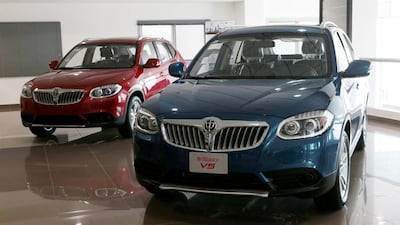You could easily mistake it for a BMW X1.
The V5, which retails for Dh55,000 at Abu Dhabi’s Al Yousuf motors, and is manufactured by Brilliance Auto, a Chinese company, looks a lot like a cheaper version of BMW’s sport utility vehicle.
And as the UAE’s consumers look for more affordable cars, it’s clear that Chinese manufacturers see a healthy opportunity in the lower end of the market.
“We receive this comment a lot from the customers: that it looks a lot like the BMW X3. And you have to agree. Because it does look a lot like the X3,” said Aziz Haroun, the Abu Dhabi area manager at Al Yousuf motors, which is the sole importer for Brillance cars in the UAE.
But while the BMW X3 will set you back about Dh250,000, the V5 can be had for about a fifth of this.
Al Yousuf also sells Brilliance Auto’s H530, which closely resembles the BMW 5 Series saloon.
Enterprising Chinese mechanics can replace the grille, badges, and logos on an H530, so that the resulting car is almost indistinguishable from the premium model.
On the Chinese eBay-style site Taobao, converted H530s posing for sale as BMW 5 Series cars are ubiquitous.
Brilliance Auto launched a joint-venture with BMW in 2003.
In a statement, BMW said that “the development of these cars has no link with any BMW products or R&D activity, though BMW Group and Brilliance have maintained a very good partnership for the successful development of the joint-venture.”
Brilliance Auto did not reply to a request for comment.
Al Yousuf’s Chinese product line, which it has stocked for a year and a half, is an example of a growing market for cheaper cars in the UAE.
“Chinese cars are an extreme case of cheaper car sales,” said Pierluigi Bellini, an analyst who covers the car industry for the research firm IHS.
Some Chinese makers are trying to get into the GCC,” but they might have a hard time in the UAE’s “sophisticated” car market, he said. “Production in China is increasing, but China is not really an export market for cars.
“Chinese manufacturers are getting better, especially in Africa, and South East Asia and the rest of Asia – but Chinese brands have not yet successfully entered the Middle East, Europe or the rest of the world.”
Rising incomes among those previously unable to afford cars have also led to higher sales for cheaper models.
In July, Toyota introduced its Avanza, a four door SUV manufactured in Indonesia, to the UAE. At Dh54,900, it is the cheapest car the company sells domestically.
Car-buying expatriates on lower incomes typically went for used cars, Mr Bellini said, but now “the more affordable cars are sold in greater volumes, because more people switch from the used market to the new car market.”
“The Chinese are very interested in selling cars to low-income consumers,” he said.
Mr Haroun of Al Yousuf motors admits that Chinese cars can be a hard sell.
“For the time being, Chinese vehicles don’t have a good reputation,” he said.
But the V5, he points out, “doesn’t look like a Chinese car”.
abouyamourn@thenational.ae
Follow The National's Business section on Twitter

